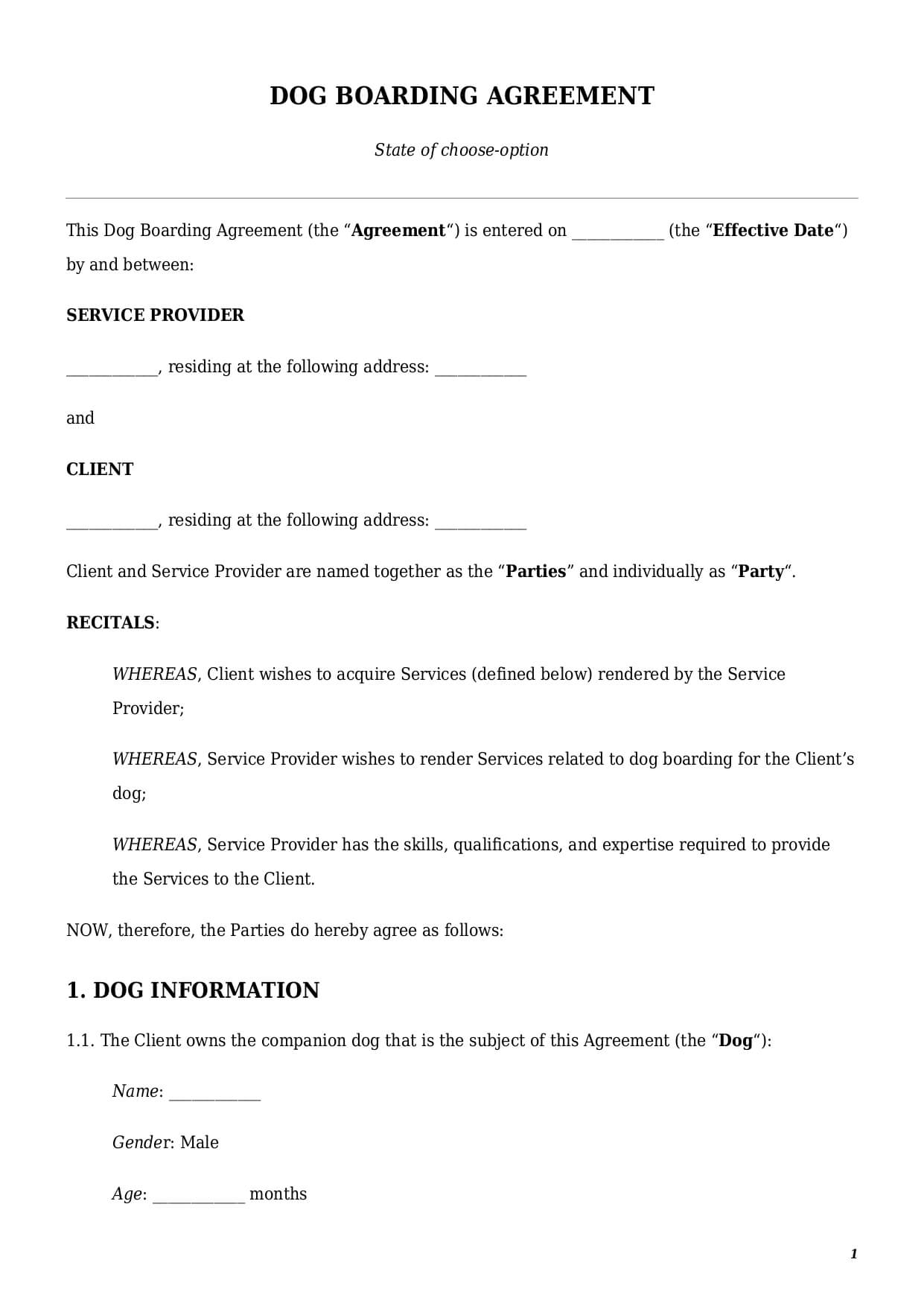Dog Boarding Agreement
Reviews


What is a dog boarding agreement?
A dog boarding agreement is a legally binding document that outlines the terms and conditions between a dog owner and a dog care provider for the temporary care and boarding of the client’s dog.
A dog boarding business typically provides services where dogs are temporarily housed in a kennel, private home, or other facility while the owner is away. Services may include feeding, administering medication, organizing playdates, and providing general care.
The present template could be used for a dog long-term boarding or short-term boarding. Despite the duration of services, the text of each agreement shall define:
- full information about the parties involved;
- detailed description of the dog;
- detailed description of services to be rendered;
- list of applicable policies, including their terms and conditions;
- payment provisions;
- liability and insurance; and
- dispute resolution and applicable laws.
The parties involved in a dog boarding agreement contract are the client and the service provider. The client is an individual who owns a dog and who wishes to order boarding services in exchange for remuneration. The service provider is normally a professionally registered business or self-employed individual.
How to create a solid dog boarding agreement template?
Drafting a strong and reliable dog boarding agreement template ensures both legal protection and peace of mind for everyone involved. Neither federal nor state laws define any particular structure a solid legal template for a dog boarding business should have. At the same time, inclusion of certain information is essential to make the document clear, complete, and legally sound.
Below we summarized all important clauses you have to include in your dog boarding agreement template.
Description of the Dog
Make sure a service provider has all necessary information about your dog. This is not only about their name, gender, breed, age, or medical history. The client shall provide additional details as follows:
- Biting history: if your dog has any past biting incidents, a service provider should know all about them.
- Vaccination history: if your dog is vaccinated, make sure to list all the given vaccines.
- Dietary needs: the service provider shall be aware of any possible dietary needs, food intolerances, or allergic reactions well in advance.
- Ongoing contagious or communicable diseases: if your dog has one or experiences any symptoms, make sure a service provider is aware of that on the pickup date.
The information listed above is particularly important for a long-term dog boarding dogs agreement, to make sure a service provider can accommodate pet care services to each dog’s needs.
Abandonment Policy
A well-drafted dog boarding agreement contract must include a clear abandonment policy. This is a clause that defines the list of actions a service provider may take when:
- the client cannot be reached after the agreed pickup date; or
- the client refuses to collect the dog.
First, the parties have to agree after which period of time a dog should be considered abandoned—it could be a few days or a few weeks. Second, the text of a dog boarding agreement contract shall define which exact actions the service provider may take. For instance:
- Contact the animal control authority to pick up the dog.
- Re-home the dog with a third party.
- Transfer the dog to an animal shelter.
- Keep the dog at the service provider’s facility and file a lawsuit against the client to compensate for the maintenance costs, etc.
Emergency Policy
Having a clear emergency policy is a vital element for every dog boarding business. This policy addresses in detail which actions the service provider may take once there is an emergency with a dog. Therefore, this clause shall include the following information:
- the client’s authorization to seek emergency veterinary care;
- detailed information about the veterinary clinic or hospital where the dog should be taken in case of emergency;
- disclaimer about the client’s financial responsibility for the emergency bills; and
- client’s emergency contact phone or email.
Payment Provisions
Every dog boarding agreement contract shall define when, what, and how the client should pay for provided services. Therefore, the payment provision clause needs to include the mandatory elements below:
- payment model (e.g., daily, weekly, or monthly fees);
- payment deadline (e.g., by the end of the month); and
- payment method (e.g., bitcoin, bank transfer, cash, etc.).
Apart from that, it is also advisable for the parties to consider certain additional considerations. For instance, what will happen if the client picks up the dog earlier than the agreed pickup date? Shall the client still pay the agreed remuneration, or could the fees be adjusted pro rata to the number of days of actual stay?
Or, if the client cancels their booking before the agreed dropoff date, shall the client still pay in full? Addressing all those questions directly in the text of a dog boarding agreement may help to prevent potential legal disputes along the road.
Waiver and Indemnification
The legally sound dog boarding agreement contract must carefully address parties’ mutual waivers and indemnifications. While it is up to the parties of the agreement to decide if they shall or shall not be liable for certain faults or accidents mentioned below:
- Loss or damage of a dog’s personal belongings: Usually, a service provider shall not be liable for any such loss or damage. The best way is to prohibit clients from bringing personal belongings of their dogs at the drop-off.
- Unforeseen dog injuries, illnesses, or death: The rule of thumb is that the service provider remains fully liable for these events, provided this is the service provider’s fault or negligence.
- Damage to a facility or other animals caused by the dog: In most of the cases a service provider may recommend all clients take additional insurance to protect themselves from situations like that one. Normally, a service provider will remain liable due to their fault or negligence.
How to customize a legal document template at Faster Draft?
To get a fully customized legal document template for your dog boarding business, follow a few easy steps below:
- Click the button “Create Document.”
- Answer simple questions in the form.
- Select a template’s format—dog boarding contract PDF or Word.
- Make a payment.
- E-sign for free, download, print, and use a customized legal template in minutes.
Table of content
Frequently Asked Questions (FAQ)
-
1. What is the difference between a dog boarding agreement and a pet-sitting contract?
While both documents deal with the provision of certain pet care services for animals, the two documents have completely different legal natures and goals.
- Who is the service provider? Under a pet-sitting service provider could be anyone, including a student, retired person, teenager, or qualified pet sitter. A service provider under a dog boarding agreement is a registered business whose main activity is to provide professional dog boarding services. Personnel has special equipment and is well-trained for that job.
- What is being provided? In a pet-sitting agreement, a person simply looks after your dog in their or at your home. Pet-sitting services could be ordered on an as-needed basis on a regular basis (e.g., two times per week). Dog boarding services are provided in a special designated facility in which your dog stays for a defined period of time.
- Who is looked after? Under a pet care agreement contract, a service provider can look after various types of animals, including cats, dogs, spiders, parrots, etc. Contrary to that, a dog boarding agreement is focused on dogs only.
-
2. What is a pet care agreement contract?
A pet care agreement is another name for a pet-sitting agreement. Under this type of legal contract, a pet care provider occasionally performs pet care services, including feeding, playing with, or looking after a pet once its owner is away.
Provision of pet care services does not require any special knowledge or qualification. If, however, you provide those types of services on a regular basis, you may need to register yourself as a self-employed person or form an LLC with the Secretary of State where you currently reside.

Looking for something Different?
Start typing to find out our collection of legal documents and contract templates
